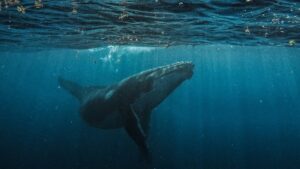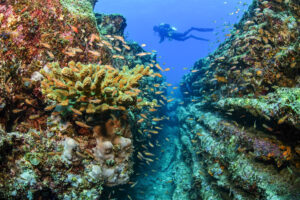New ground broken for transparency and action at Our Ocean 2025
Our Ocean Conference is underway in Busan, South Korea this week, celebrating ten years of action for the ocean, having unlocked some $133 billion in funding for ocean projects over the last decade and already major milestones in transparency and finance have launched.
From pioneering new mechanisms that intend to help developing countries fast-track ocean protection programmes to the formation of groundbreaking coalitions to better tackle illegal fishing across international waters, the tone of the 2025 Our Ocean Conference appears to be well and truly set as the nations convene in Busan, South Korea this week to celebrate ten years in true style: by taking some much-needed action.
A new report, launched this week, lays it quite bare. In the ten years since Our Ocean launched onto the scene, the Conference has helped to unlock an impressive $133 billion in funding for ocean action the world over – which is no mean feat.
Yet, while the report – published by the World Resource Institute to mark the Conference’s 10th anniversary this year – certainly makes space for the customary self-congratulations as nations once again convene to implement the next crucial steps towards protecting both the ocean and its biodiversity, it is also quick to underscore that the hard work has only just begun.
Rather than dwell on what has been achieved, the report is a springboard for the hurdles we are all yet to overcome to achieve the overarching goal of protecting 30% of the ocean by 2030, setting the 2025 Our Ocean Conference up to be – quite possibly – the most crucial one to date.
And early signs suggest that it’s up to the challenge.
This week, the High Ambition Coalition for Nature and People (HAC for N&P) officially unveiled its Rapid Deployment Mechanism – a ‘transformative new tool’ designed to help developing countries fast-track the implementation of their global 30×30 biodiversity goals.
Following HAC for N&P’s 2024 Earthshot Prize win in the Revive Our Oceans category, the Rapid Deployment Mechanism aims to provide swift, small-scale grants ranging between $25,000 and $50,000 to support the developing countries committed to protecting 30% of the planet’s land, inland water, and ocean by 2030. With just 8.4% of the ocean and 17.6% of land and inland waters currently protected, and under five years left to deliver on the 2030 goal, the support offered through this initiative could be catalytic.
“This mechanism answers an urgent call from our members: the need for rapid, flexible support to translate ambition into action,” said Rita-Zaghloul, director of the HAC for Nature and People. “By empowering local actors and national governments with early-stage funding, the Rapid Deployment Mechanism unlocks momentum toward impactful conservation on the ground.”
Focused on what it calls ‘high-impact, country-driven initiatives’, the Rapid Deployment Mechanism will support a wide range of activities related to the development and implementation of the 30×30 target, including in the support of public policy; helping to build capacity within countries through education, training, and workshops; supporting the implementation of action; and building partnerships by offering a space for country-to-country best practice exchanges and unlocking sustainable finances related to the 30×30 target.
It’s hoped that the Rapid Deployment Mechanism will go new lengths towards building a new future for ‘conservation finance’ by providing the initial capital to help unlock bigger investments and partnerships.

Meanwhile, new ground has been broken in an aligned approach to tackling illegal fishing with the formation of a coalition to stand against illegal practices, advance transparency, and hold bad actors accountable.
Host country, South Korea, along with Ghana and Cameroon, have now officially endorsed the Global Charter for Fisheries Transparency – a set of ten policy principles designed to ensure that information about vessels and fishing activity is widely available to promote responsible fisheries management, eliminate illegal practices, and protect human rights at sea.
Panama has also made a key commitment to the Charter, pledging to publish the ownership of fishing vessels.
It’s a milestone moment for legal, sustainable, and ethical fisheries worldwide and – according to Steve Trent, CEO and founder of the Environmental Justice Foundation and co-chair of the Coalition for Fisheries Transparency, a “vital breakthrough for people and our planet”.
“Our research has shown that when seafood supply chains aren’t properly monitored, high-risk fishing vessels can slip through the cracks, selling seafood linked to illegal fishing and human rights abuses into national markets and the global seafood supply,” he said.
“The problem is clear: we can’t manage what we can’t see. By embracing transparency, these countries are charting a course for others to follow. Transparency may seem abstract, but it is a powerful tool for a better future. It ensures fishers can work safely and with dignity and it levels the playing field for responsible operators.
“With Korea, Ghana, and Cameroon now leading the way, the message is clear: transparency is no longer optional. The question now is: who will be next?”
Since the inaugural Our Ocean Conference in 2014, the annual event has become something of a leading platform for governments, businesses, and civil society to make commitments to advance marine conservation, ocean-based climate solutions, and sustainable blue economy initiatives.
In fact, the World Resource Institute has identified over 2,600 commitments for ocean action made via the Conference over the last ten years, collectively worth some $160 billion. As of January 2025, $133 billion has already been delivered or is in progress.
“The 10th Our Ocean Conference will encourage the international community to take immediate action to address the crisis our ocean is facing under the slogan ‘Our Ocean, Our Action,’ said Do-hyung Kang, Minister of the Ministry of Oceans and Fisheries of the Republic of Korea.
“The conference will primarily focus on the achievements and success stories over the past ten years while establishing the future direction for international cooperation over the next decade. It is set to be a significant moment for international cooperation, providing a crucial foundation for our collective efforts towards a shared future.”


"*" indicates required fields
Printed editions
Current issue
Back issues

Current Issue
Issue 41 Holdfast to the canopy

Back Issues
Issue 39 Special Edition: OPY2024
Enjoy so much more from Oceanographic Magazine by becoming a subscriber.
A range of subscription options are available.








